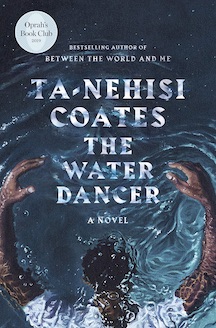By Daniel Myers
Renowned writer and Phi Beta Kappa member Ta-Nehisi Coates has added a new medium to his repertoire: the novel. Coates has released his debut novel, The Water Dancer, which tells the story of an enslaved man named Hiram Walker and his quest to escape slavery in the Antebellum American South. Best known for his non-fiction, Coates released the novel in September to critical and popular acclaim, a reception which was certainly bolstered by Oprah’s choice to feature it as the first book to re-launch her famous “Oprah’s Book Club.” The late Toni Morrison lifted Coates as the artist to “fill the intellectual void” following James Baldwin’s death, and Coates’ cross into fiction appears to be a step closer to fulfilling that call.
This is not the first time that The Key Reporter has reported on Coates. We published an article in 2016 following Coates’ honorary induction into Phi Beta Kappa at Oregon State University; the article chronicled his achievements to that point, including a MacArthur Fellowship Grant, a National Book Award, and many more accolades. The Water Dancer warrants a revisiting of Coates’ career though, as the novel marks a pivotal moment for Coates; the release of his first novel is both the culmination of ten years of projects and the inception of a new trajectory for his work.
The release of The Water Dancer may appear to be a departure from the non-fiction which won him such accolades, but Coates has been quick to remind us that this novel actually predates the majority of his most recognizable projects. “I actually started working on this in 2009,” said Coates in an interview on Democracy Now! “So what that means,” continued Coates, “is that this book… predates Between the World and Me, predates The Case for Reparations, predates the vast majority of the work in We Were Eight Years in Power. This is, in many ways, one of my oldest published works.”
The Water Dancer pulls from a variety of primary sources like slave narratives and accounts. Even the book’s inclusion of magic, seen in Hiram’s ability to bend space through a power called “conduction” has roots in historical accounts. “Magic exists and is all through the world of enslaved black folks. When Frederick Douglass talks about his first escape attempt he talks about one of his fellow enslaved African Americans giving him a root that will grant him special powers,” Coates noted during his Democracy Now! interview. Also critical to the book’s ability to bring the world of Antebellum slavery to life was Coates’ visits to several plantations, the most influential of which was Monticello; in a segment on “CBS This Morning” Coates describes how it was not until he visited Monticello and saw both the main house and the slave quarters—now only foundations in the woods—that he could accurately capture the details of life on a plantation.
Coates’ work of fiction is not necessarily separate from his non-fiction, but can instead be seen as another chapter in Coates’ investigation of slavery’s legacy in America. The majority of Coates’ memoirs, essays, and articles deal broadly with issues of race in America; for instance, his article “The Case for Reparations,” published in 2014, traced the history of economic injustice against African Americans in a powerful piece which led him to testify before Congress this summer on H.R. 40, a bill about reparations. As Coates noted in a conversation with historian Ibram X. Kendi, The Water Dancer is an attempt to animate the aspects of slavery most important to him: “I wanted to emphasize certain aspects of slavery that I feel like don’t get enough attention….What I was interested in was how enslavement…functioned as a destroyer of black families for profit.” Portraying slavery’s legacy as one of theft and piracy can be seen throughout Coates’ work, but The Water Dancer has the unique opportunity to highlight the emotions and feelings of those who lived through slavery.
As for what Coates’ next steps are, it seems the work he has done with The Water Dancer has inspired him. In his interview on “CBS This Morning,” Coates reflected on the role of his work to this point, saying “today I was talking with one of the historians here [at Monticello] and I was thinking ‘what if it’s my job just to tell the story of the enslaved?’ … I think I would [be satisfied].” Regardless of whether he chooses that path or not, Coates has already become a leading American intellectual and is representing Phi Beta Kappa well as he continues to tell stories about America’s past and present.
The Water Dancer can be found at your local bookstore or online; the novel can also be experienced as an audiobook, an experience that may be equally enjoyable given the lyricism of Coates’ prose.
Daniel Myers is a recent graduate of the College of Wooster with a bachelor’s degree in English and theatre and dance. The College of Wooster is home to the Kappa of Ohio chapter of Phi Beta Kappa.




